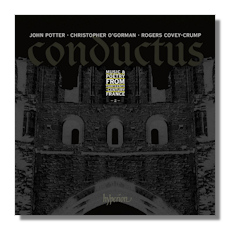
The Internet's Premier Classical Music Source
Related Links
- Latest Reviews
- More Reviews
-
By Composer
-
Collections
DVD & Blu-ray
Books
Concert Reviews
Articles/Interviews
Software
Audio
Search Amazon
Recommended Links
Site News
 CD Review
CD Review
Anonymous 13th Century

Conductus, Volume II
- Bulla fulminante (unmeasured) 1
- Ave, virga decoris incliti 1-3
- Celorum porta 1,2
- Quid ultra tibi facere 3
- Gaude, virgo virginum 1,2
- Veste nuptiali (unmeasured) 2
- Ave, tuos benedic (two-part) 1,2
- Ave Maria Salus hominum 1-3
- Dic, Christi veritas (monophonic) 3
- Ave, tuos benedic (three-part) 1-3
- Excutere de pulvere 1
- Librum clausum et signatum 1,2
- Aurelianis civitas 3
- Dic, Christi veritas (three-part) 1-3
- Veste nuptiali (measured) 2
- Naturas Deus regulis 1-3
- Bulla fulminante (measured) 1
1 John Potter, tenor
2 Christopher O'Gorman, tenor
3 Rogers Covey-Crump, tenor
Hyperion CDA67998
This is the second volume of music and poetry from thirteenth-century France. Volume I with the same three singers appeared in September 2012 on Hyperion CDA67949. The "Conductus" (plural also "Conductus") is a sacred, though not liturgical, composition for one or more voices from the period of the ars antiqua. Deriving from the moment in the service when the lectionary was "escorted" ("conducted") from where it was stored to where it was about to be read, the form has received less regard than the organum and motet: there are certainly proportionally fewer CDs in the genre. One aim of these releases is to "rehabilitate" the Conductus.
The precision and insight with which both that first CD – and now this one – were prepared predispose it to success in drawing attention to the "Conductus". Add to the underlying scholarship a persuasive, projected yet at the same time relaxed approach to the singing on the part of tenors Potter, O'Gorman and Covey-Crump and a thrilling repertoire and the CD must be deemed an immediate success.
The articulation of such small gems as Gaude, virgo virginum [tr.5] where declamation is avoided assiduously – despite the subject – in favor of a gentle yet confident almost feline curve of sound is typical of this immediacy of style. The three singers know the material so well that they (can) present it as if it had been written recently. All three sing together on fewer than a third of the dozen and a half or so numbers here; slightly more feature just one tenor. You can hear breathing, as part of the singers' expression. Listen, particularly, to Covey-Crump in the central section of one of the very moving monophonic works, Dic, Christi veritas [tr.9]. Whenever there is more than one singer, they both or all display a sense of urgency that matches their wish (completely fulfilled) to explore and expose the interplay between dialog and reflection.
At the same time, the singers' respect for the idiom and its presumed place in the liturgy tempers their delivery: these are not bouncy, extrovert or superficial performances. Rather, they proceed as one imagines they might well have done in the thirteenth and fourteenth centuries. They're sung here with no self-consciousness or sense that this singing was anything other than music in the service of religious belief; belief that was joyous, enduring and all the more so because it was (and is) approachable.
In other words, on the one hand the three singers strike a balance between quietly elevating the music and words by virtue of their distinct substance rather than their aura; and on the other by rendering it approachable and enjoyable to C21st minds and ears almost thanks to those same qualities – certainly the enduring nature of the genre. Indeed, it's been estimated that over 800 Conductus are known to have been composed across the length and breadth of mediaeval Europe. The controlled veneration and empathy exhibited so well here by Potter, O'Gorman and Covey-Crump are entirely in accord with how we should receive the music from this world.
Another aspect of this release which commends it to us is variety. Although the subject matter of Conductus ranges from plain imprecations to the Virgin to quite specific allusions and references to Papal authority, it's to the credit of the singers that we are curious to know what comes next. Then delighted when it does.
There are uncertainties about the origins and ways in which Conductus were sung. This CD, though, makes very reasonable assumptions about those; then it concentrates on the music as music. The result is that it speaks very directly to us. This, it can be claimed, lies at the heart of the success of this CD. Although not the only place where most of the items here presented are to be found, these are special and specially convincing performances. Singing in the genre at its compelling best.
The acoustic (of St. Margaret's, York) is responsive to and complementary of the singing style of Potter, O'Gorman and Covey-Crump. It adds a genuineness to the sound that amply fits the approach of the singers themselves. The booklet contains a very informative essay on the context of the Conductus – especially their subject matters and structures – as well as brief biographies of the tenors performing here; and full texts in Latin and English. This is something of a neglected corner of the mediaeval repertoire. And here's as good an introduction as possible. Even if you didn't get the first Volume (which you should), this is to snapped up without doubt or delay.
Copyright © 2014, Mark Sealey





















